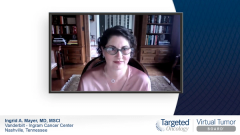
Case 2: Recurrence in High-Risk HR+/HER2+ Breast Cancer
Ingrid Mayer, MD, MSCI, presents the case of a patient with high-risk HR+/HER2+ breast cancer who develops recurrence after a long disease-free interval.
Episodes in this series

Sara Tolaney, MD, MPH: Ingrid, you’re going to be presenting a case that focuses on hormone receptor–positive, HER2 [human epidermal growth factor receptor 2]–positive disease and look at a situation where someone can recur in this setting and where to go from there.
Ingrid A. Mayer, MD, MSCI: This is a 51-year-old woman. She is postmenopausal. She was diagnosed 5½ years ago with phase 3 breast cancer. At that time, she had grade 3 invasive ductal carcinoma. It was ER [estrogen receptor]– and PR [progesterone receptor]–positive and HER2+, and she was not BRCA mutated. She had neoadjuvant TCHP [docetaxel, trastuzumab, pertuzumab, carboplatin] with a good clinical response. Had a mastectomy. Had a path CR [complete response] and went on to receive adjuvant HP [trastuzumab, pertuzumab] with an aromatase inhibitor because she was postmenopausal.
Sara Tolaney, MD, MPH: This is a patient who achieved a pCR [pathologic complete response] and went on to complete a year of HP [trastuzumab, pertuzumab] therapy and endocrine treatment. When you think about a patient like this who does have a pCR, different from our first case, what are you thinking about her risk of recurrence and also that timing of recurrence in a patient who has hormone receptor–positive, HER2+ disease vs hormone receptor–negative, HER2+ disease?
Ingrid A. Mayer, MD, MSCI: This is a triple-positive disease, which is a different beast from HER2+, ER-. The ER- cases, if aggressive and residual disease, tend to recur very quickly. If you’re going to see a recurrence, you typically do that within the first 5 years. The ER+, HER2+ case is a little different. At that point, you could have a very heterogeneous cancer cell population going out at the same time. You may have cells that are only HER2, cells that are only ER and PR, and cells that are both. When you don’t have residual disease, or you have residual disease and have a retest of that, you don’t know what kind of cells are still going to be floating around there and what will recur. For patients with triple-positive disease, we may have a false sense of reassurance if they don’t recur within the first 5 years. But they can have late recurrences, and that’s very different in the ER- ones. In that sense, it works a little like ER+, HER2- patients where late recurrences can be. The risk is not as high as with the ER+, HER2-, because, I hate to say this, but I’m getting to the conclusion that no patient with ER+ disease is actually curable. If they live long enough, they will have a recurrence. But with HER2 disease, because the HER2 treatment is so strong and the synergy is good, these patients don’t have superhigh risk of recurrence, but they can still recur. And if they do, they can recur late. The 5-year rule here may not quite apply.
Ingrid A. Mayer, MD, MSCI: But I estimate that this patient would have had a low risk of recurrence due to the past CRR [complete response rate]. Typically, these patients have less than 5% risk of recurrence, but it’s not 0.
Sara Tolaney, MD, MPH: I know. It’s definitely not 0, but it’s certainly much better than someone with residual disease. To your point about timing, it also came out when we saw updated APHINITY data. When we saw the initial APHINITY analysis, we saw no benefit for pertuzumab in ER+ patients. That was at an early 3-year median time point. But once you got to 6 years, you saw benefit in that ER+ group, and it was purely the timing of events in that ER+ group, which do occur later. To see that benefit, you have to wait a little.
Transcript edited for clarity.












































